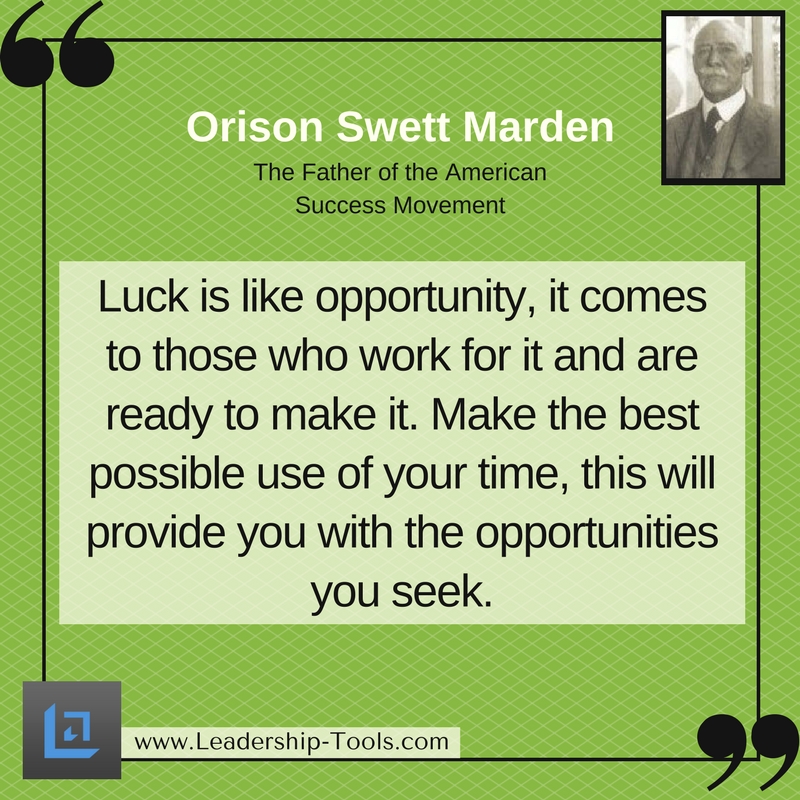- Home
- Self Growth Library
- Prosperity Chapter XVIII
Prosperity Chapter XVIII
Time Is Money - And Much More
Prosperity ChapterXVIII:
When Queen Elizabeth of England was dying she said, "My kingdom for a moment!"
One of the richest men in the world said he would give millions of dollars to be assured of a few more years of life. The late J. Pierpont Morgan used to say that every hour of his time was worth a thousand dollars. It was probably worth many thousands of dollars, even if measured by money alone, for the accumulation of a vast fortune was only an incident in Mr. Morgan's many-sided career.
But time is infinitely more valuable to us than is shown by its money-making power. I have never known of any person to make his life worthwhile in any direction until he came to the realization of the immense value of time. Time is our most precious asset, our greatest riches; because in it live our success, our happiness, our destiny.
Yet multitudes are engaged in killing time. Their chief aim in life is to fritter it away as rapidly as possible. They do not realize that this is infinitely more wasteful than it would be for a rich man to throw hundred dollar bills or valuable diamonds into the sea, or to do as Cleopatra did, dissolve priceless pearls in a glass of wine and drink them.
The future of a young man can be fairly gauged by the value he puts upon his time, especially his spare time.
From the foundation of the American republic the greatest and most successful Americans have been men who not only in their youth but all through their lives made use of every spare moment in broadening their minds, adding to their knowledge, and developing their ability along their special line.
The Washingtons, the Franklins, the Lincolns, the Burritts, the Morses, the Fields, the Edisons, the men in every line of endeavor all over the civilized world who have done great things for mankind and made themselves famous, achieved their great work not because they were geniuses, but because they got from every minute of time its full value.
"I have in my time known many famous in war, in statesmanship, in science, in the professions, and in business," said the late U. S. Senator Hoar of Massachusetts. "If I were asked to declare the secret of their success, I should attribute it, in general, not to any superiority of natural genius, but to the use they made in youth, after the ordinary day's work was over, of the hours which other men throw away or devote to idleness, or rest, or society.
The great things in this world have been done by men of ordinary natural capacity, who have done their best. They have done their best by never wasting their time."
There are many so-called common or ordinary employees today, who, perhaps, think they haven't nearly as good a chance to rise as their more brilliant or showy companions, who will within a few years be filling high positions. The history of the past shows that every year brings out multitudes of giants from the ranks, often young fellows who are more surprised at their rapid advance than the employers who are watching them.
"Our todays are the blocks with which we build our future. If these are defective, the whole structure of our life will correspond. That marvelous future which you have dreamed of so long will be exactly what you put into your todays."
- O.S. Marden
The only reason why anyone remains a common, ordinary employee, doing routine work and drawing a small salary, is not because he doesn't have the ability to rise higher, but because he is not awake to the possibilities in his spare time.
Charles M. Schwab had no more ability perhaps and no better chance to rise than the hundreds of other young men who were working with him at the Homestead plant of Andrew Carnegie when he started in at a dollar a day. The reason why he has become a millionaire and a king in his line is because he saw the necessity of a better education than he had at that time, and devoted his evenings and spare time to making good his deficiencies, and particularly to acquiring special knowledge in regard to iron and steel.
He was always on the alert to improve his opportunities, always preparing himself to be ready to fill positions next above him in case of a vacancy. That is why his rise was so rapid, why he is today one of the richest and most prominent business men in his line in the world, while his early fellow workers who preferred "a good time" to self-improvement in their spare time have never been heard from. Speaking of those early days when he was beginning to attract attention at the Carnegie works, Mr. Schwab said:
"At that time science began to play an important part in the manufacture of steel. My salary at the age of twenty-one warranted me in marrying, so I had a home of my own. I believe in early marriages, as a rule. In my own house I rigged up a laboratory and studied chemistry in the evenings, determined that there should be nothing in the manufacture of steel that I would not know. Although I had received no technical education, I made myself master of chemistry, and of the laboratory, which proved of lasting value."
"The point I wish to make," continued he, "is that my experimental work was not in the line of my duty, but it gave me greater knowledge. Achievement is possible to a man who does something else besides his mere duty that attracts the attention of his superiors to him, as one who is equipping himself for advancement. An employer picks out his assistants from the best informed, most competent and conscientious."
"One is so tired after a day's work he does not feel like studying," is an excuse often urged by young people when reminded that they are not doing anything to advance themselves. It is only the excuse of those who are too lazy to work for what they want, or who lack the ambition to climb.
It is well known that a change of occupation in the evening, — the bringing into play of a different set of muscles, brain tissues, ideas, and thoughts, generally rests rather than tires one. Of course everyone should take a proper amount of time for needed recreation, exercise and rest, but very often those who claim they are too tired to study evenings waste more energy in foolish dissipation or dawdling aimlessly around doing nothing than they would spend in reading or study.
Only a short time ago I read of a young school teacher who learned six or seven languages in her spare time, and who managed, by earning some extra money evenings in teaching private pupils, to save enough money to go to Europe, to perfect herself in these languages. The enjoyment and breadth of culture she got out of her travels in the different European countries would have been a great reward for the sacrifices she made; but she got much more than that, for she advanced rapidly in her profession, and is now an instructor in French, German, and Italian in a high school for girls.
"The whole period of youth," says Ruskin, "is one essentially of formation, edification, instruction. There is not an hour of it but is trembling with destinies — not a moment of which, once passed, the appointed work can ever be done again, or the neglected blow struck on the cold iron." Millions of down-and-outs are today bemoaning the loss of the golden opportunities they allowed to slip by in youth, the evenings and holidays they idled away when they might have been laying the foundations for a happy, successful future. But they couldn't eat their cake and have it too, and now they feel it is too late even to try to make good.' They feel that they have nothing to look forward to but an old age of poverty and bitter regrets.
There is no magic which can give a youth a golden future when he is slipping careless, slipshod work and wasted hours into the fabric of today. Ambition, courage, industry, vim, energy, initiative, thoroughness poured into your day's work, and perseverance in self-improvement in your spare time, these are the ingredients warranted to make a golden future, to bring you wealth, knowledge, wisdom, power, fame — whatever you set your heart on.
"Believe me," said England's great statesman, William E. Gladstone, "when I tell you that thrift of time will repay you in after life with a usury of profit beyond your most sanguine dreams, and that waste of it will make you dwindle alike in intellectual and moral stature beyond your darkest reckoning."
The way in which they spent their spare time has made all the difference between mediocrity and grand achievement to tens of thousands of men and women, who were intelligent enough in youth to know the value of the priceless odds and ends of time which others were recklessly wasting.
If someone offered to purchase a large percentage of your life power you would not think of selling it, even for a fabulous sum. It is what gives you your chance to make good, to make your life a masterpiece, and naturally you would not part with it. You would say that you could not afford to sell your birthright of power in which is wrapped up your whole destiny, — your enthusiasm, your zest, your career, your ambition. But do you realize that you are practically doing the same thing when you allow your most precious success asset, your time, to run away from you in all sorts of leaks; in sheer idleness, in dissipation, in superficial, silly pleasures, or worse, in pleasures which kill your self-respect and make you hate yourself the next day?
If you would succeed in any adequate way, in a way at all commensurate with your possibilities, you must not only shut off all time leaks, but you must also repair every leak in your mental and physical system, and stop every output of energy that does not tell in rendering you more fit to make your life the great success it is possible for you to make it.
How often we are reminded of the value of time by the expression, "Time is money." But time is more than money; it is life itself; for every separate moment as it flies takes with it a part of our life span. Time is opportunity. Time represents our success capital, our achievement possibilities. Everything we hope for, everything we dream of accomplishing is dependent on it.
"Short as life is," said Victor Hugo, "we make it still shorter by the careless waste of time." I would advise every youth starting out in life to put that sentence up on the wall in his sleeping room, and over his desk or work bench, where it would constantly remind him of the immense possibilities stored in the minutes and hours of every single day. If at the outset of your career you resolve to make good every day, and live up to your resolution, nothing can keep you from being a successful man or woman, a superb character.
"The world grants all opportunities to him who can use them. Power and fortune are hidden away in the hours and moments as they pass, awaiting the eye that can see, the ear that can hear, the hand that can do."
- Orison Swett Marden
Prosperity Chapter XVIII, continued...
You are the architect of your fate, the master of your destiny, and right now you are shaping your future. Every day is a step nearer to, or farther from, the goal of your ambition. The precious hours of youth are invaluable. The realization of all your dreams lives in them.
Letters come to me from time to time from young people deploring the fact that it is impossible for them to attend school or college. They say they have to work for a living, and therefore have no opportunity to acquire an education. They never stop to think that many of the most prominent men and women of the world have been self-educated. I do not mean that they have worked their way through school or college, but that they have actually gained an education in its widest and best sense, by their own efforts, with little or no actual schooling.
You who complain that you have no opportunity to get an education, and therefore no opportunity to do anything worthwhile, read the lives of men and women who have lifted themselves into places of power by self-education, biographies like that of Franklin, of Lincoln, of Greeley, of Garfield, of men of all nations who came from the direst poverty, and by sheer force of will and the wise use of every spare moment lifted themselves to the highest stations of life, to positions of honor, of great power and wealth.
As Hamilton W. Mabie said: "One of the prime qualities of a man of force and ability is his clear understanding of what can be done with the time and tools at his command. Such a man wastes no time in idle dreaming of the things he would do if he could go to college, or travel, or have command of long periods of uninterrupted time. He is not guilty of a feeble evasion of 'no possibility' for his career by getting behind adverse conditions. If the conditions are adverse, he gets in front of them, and so gets away from them.
"The question for each man to settle is not what he would do if he had means, time, influence, and educational opportunities; the question is what he will do with the things he has. The moment a young man ceases to dream or to bemoan his lack of opportunities and resolutely looks his conditions in the face, and resolves to change them, he lays the corner stone of a solid and honorable success."
No matter how limited your time, or how exacting your daily work, you can so train your mind, so cultivate yourself by reading and study in your spare moments, that you can, if you will, become an educated man or woman, with a much broader outlook on life and an infinitely greater earning capacity than the uneducated man or woman.
Andrew Carnegie, the young Scotch lad, for example, had only an elementary school education at the start, but by reading and studying in his leisure moments he acquired the culture that fruited in several books and many magazine articles on topics of worldwide interest, to say nothing of his business achievements and the immense fortune he acquired.
George Stephenson, inventor of the locomotive engine, seized every leisure moment as though it were gold. He educated himself and did much of his best work during his spare time. He learned to read and write at a night school, and studied arithmetic during the night shifts when he was assistant fireman in a colliery.
The lives and work of multitudes of the world's benefactors prove that no matter what investment a man may make in life, there is none so satisfactory as self-investment, — coining bits of leisure into knowledge and power.
The bigger the man the greater value he puts upon time. He regards it as a great asset, as the most precious capital, which can enrich life. Whether his ambition be to acquire a fortune or to achieve success in some other direction, he knows that everything depends on what he does with his spare time.
Weak natures, on the other hand, never regard time as a precious asset, they never want to pay the price which strong natures are willing to pay, to make their dreams come true. They can not resist the lure of pleasure for the sake of their ambition. They practice no more thrift in the use of their time than they do in the use of their money. They kill a lot of time without realizing that in doing this they are killing their prospects, killing their future, killing themselves.
"I will make this day worth while!" would be a splendid daily motto for all of us to adopt. When you awake in the morning; when you start to work; and many times during the day, say to yourself: "I will make this day worth while. It shall not pass into the story of my life as time half wasted, or not utilized to the best advantage. No matter whether I feel like it or not, I am going to make this day count. I am going to make it stand out in my life as a red-letter day, one in which my work was effective, efficient."
"Few of us realize the connection between the day, the hour, in which we are living, and our success, our happiness, our destiny."
If you do this every day you will be surprised at the wonderful
effect it will have upon your whole life. It will lift it to the highest
point of your possible efficiency and effectiveness. It will mean
everything to you both in character and financial returns.
Someone says: "All that time is lost which might be better employed." If all of us realized the truth of that, there would be more success and fewer failures in life. Each of us has the same number of hours in his day, the same number of days in his year, and the chief difference between the success and the failure lies in the use to which the hours' and the days are put. Given the very same environment, the same chances to succeed, and one youth will rise to fame and fortune by the right use of the time that another recklessly wastes.
The harvest of our tomorrows will be like the seed we sow today. If we do not put that quality into the present moment that we expect in our success, in our character, in our life as a whole, it will not be there.
If there is not energy, vim, courage, initiative, industry, a high quality of work in today the results of these cannot appear in your future. It is the daily ambition which starts out every morning with the firm resolution not to let the hours slip through one's fingers until one has wrung from them their utmost possibility that makes the successful day; and it is the accumulation of daily successes that makes the big life success, that enables the man to realize the ambitious dream of the boy.






